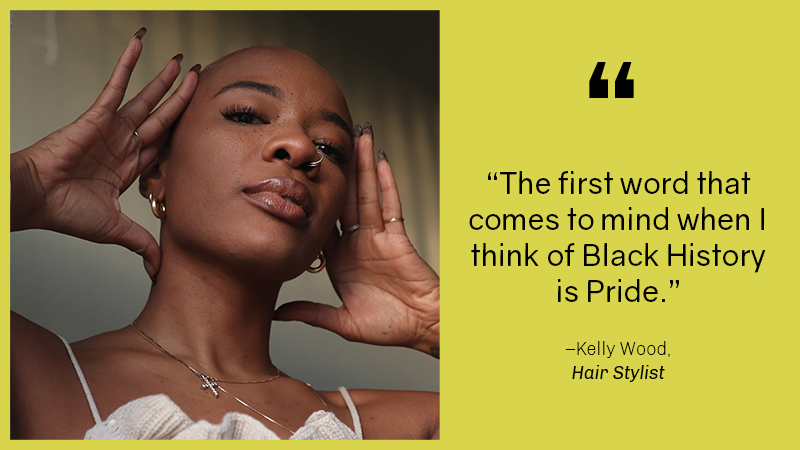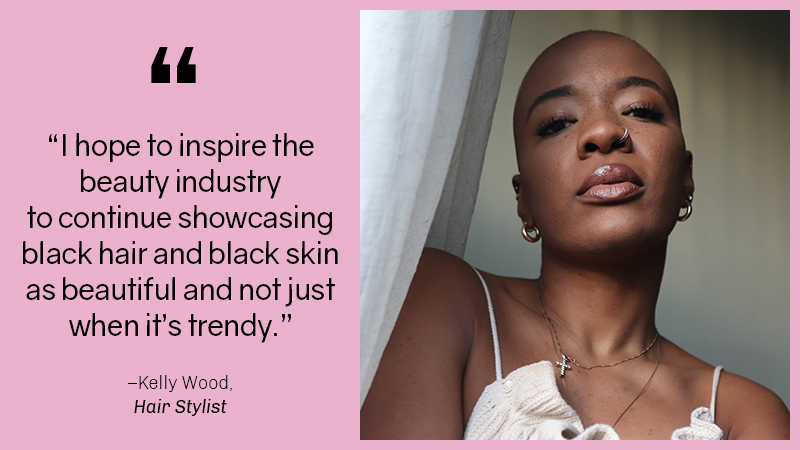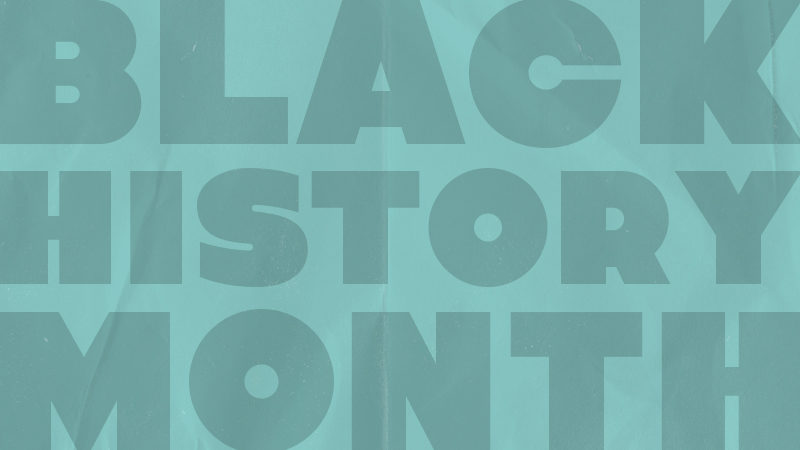Black History Month gives us all the opportunity to recognize the culture and achievements of the Black Community. One industry this community has a significant impact on is the beauty industry, but if you look at the products and ads in the beauty world, you wouldn’t know it.
At oVertone, we strive for inclusivity and diversity, but we acknowledge that more work needs to be done to achieve this, both as a business and as a member of the beauty industry. That’s why we’re amplifying Black voices in beauty, now and in the future, to learn how we can all make a change.
To kick things off, we spoke to Pro Stylist Kelly Wood to hear about what Black History Month means to her and how it feels to navigate the industry as a person of color.
Keep reading for the full conversation.
Q: What does Black History Month mean to you?
A: The first word that comes to mind when I think of Black History is Pride. Black History Month growing up was the only time in school when I saw (a little) representation of positivity regarding black people in this country.
Now that I’m an adult I can definitely say that I take pride in Black History Month. I carry it with me throughout the year, not just in February. I believe I take so much pride in it because I actually feel like someone who is contributing with my own role to our story in this country as a creative.
Q: What do you want people to know about Black History Month?
A: I think the word “history” automatically makes us think past tense. I want people to recognize our history is still happening now. The good, the bad, and the ugly. Black History Month was created to honor our contributing roles and achievements in this country, but the recognition should not stop March 1st.
Q: How do you intend to celebrate, reflect or participate?
A: I don’t necessarily celebrate Black History Month like I would a holiday. I do however have an awareness of what it is and how I want to continue to contribute to our history. 2020 was a very transformative year for me.
I have been evolving spiritually and a part of that experience involved me connecting with an ancestor of mine. She’s been guiding me through my creative ideas and my spiritual curiosity. I believe connecting and honoring her will be the center of my celebration this month.

Q: What inspired you to go into the beauty and haircare styling industry?
A: Well speaking of ancestors, I’ve got plenty of them who were in the beauty industry. I’m a third-generation hairstylist. My mother is still practicing hair and had a full-service salon for most of my childhood. My grandmother was also a hairdresser for many years and my mother worked alongside her when she graduated cosmetology school.
It runs in the family, which gave me the confidence to try it myself. I knew it was a career I would have support in and I knew I would be successful. It’s been written in my stars.
Q: Can you tell us about the most impactful experience you’ve had working in the beauty industry?
A: I believe the most impactful thing about being in this industry is the people. I love the human experience, I love learning from every client that sits in my chair. I love the fellowship, the laughs, I love making people fall in love with their hair, and ultimately falling in love with themselves. I think that black women especially have been taught that our hair is difficult or less attractive.
I strive for everyone to have a healthy relationship with their hair.
Be kind and have patience with yourself and your hair. Making my clients feel like their hair is their own hair goals is so fulfilling to me. Through helping others I have tapped into who I really am too and I’ve been able to fall in love with my own hair and who I am at the same time. It’s been a beautiful journey, to say the least.
Q: What advice would you give young Black stylists who are trying to launch their career?
A: Three HUGE pieces of advice that really helped me was to:
- Make sure you love this job. This job is fun and can have its glamorous side but it can be taxing on your body, mind, and spirit. It is imperative that you protect your peace. It can be very challenging exposing yourself to so many people and absorbing so many different peoples’ energy. If you’re only doing it for the money, I guarantee you’ll burn out within the first 5 years. If you are doing what you truly love, you will never work a day in your life.
- Never stop learning. You only learn a small fraction of what it takes to be successful in cosmetology school. Their sole purpose is to help you succeed in passing your state board exam. The learning should never stop after cosmetology school. I have assisted hairstylists who were 40+ years in the industry, still paying thousands of dollars in education a year. The beauty industry is an ecosystem that is forever growing and changing. If you don’t flow with it. You will be left behind.
- Charge what you’re worth.

Q: How do you represent yourself and the Black Community through your work?
A: I represent my community just by being my true self. I have my own unique black experience and I always bring that to the table no matter what room I’m in. That’s what makes me stand out. I grew up surrounded by diversity in the San Fernando Valley. I was a kid that loved self-expression. I admired celebs like Beyonce and Rihanna because they seemed to have no problems outwardly expressing themselves.
Now don’t get me wrong, my mama kept my hair laid. We always played with extensions, and braids which I love. But I hated that when it came to my natural hair I had no education. I couldn’t find anyone to do my hair the way I was seeing it on MTV or 106 and Park. I could only get my hair to do one of two styles straight, or straight with a ‘bump’.
I wanted bouncy volume, I wanted beach waves, I wanted edgy haircuts, I wanted peek-a-boo colors. I wanted styles that I saw on movies and music videos. That’s when blowouts got my attention. When I was starting cosmetology school it was an unusual thing for black women to get blowouts. No one knew how to do them, not even our educators or my own mother.
I believe it’s because society has taught us that our hair is difficult or unmanageable. Which is completely unfair and NOT TRUE. It took a lot of patience and love but I started specializing in blowouts to give my black girls (and guys) the star treatment by giving them hair they saw in magazines and on TV.
Q: How do you hope to impact the beauty and haircare industry?
A: Contrary to what our normal societal beauty standards are, I hope to inspire the beauty industry to continue showcasing black hair and black skin as beautiful and not just when it’s trendy. I have been blessed to start moving my career into the direction of creative directing and content creating.
Any project I work on, or produce, no matter how big or small I make sure I’m creating the kind of environment we can ALL thrive in. By treating my peers with respect and love, paying black creatives what they’re worth so they can feel valued, diversifying my models and not just picking models with “easy” hair, showcasing beauty content on platforms that allow black hair, and black skin to be seen by the masses and not just the four walls of our community.
Black people in general have always had to start from way behind the starting line to gain success, which is exhausting, to say the least. Most of us are tired before we can even begin. I believe this industry has a monumental responsibility.
We all know how much this industry impacts how the world sees beauty. Whatever we deem as acceptable in our industry the world follows. The beauty industry has the power to change the world, I hope to be an impact to the world by changing the beauty industry.
Learning about different viewpoints and experiences within the world of beauty helps the entire industry change for the better. Stay tuned to our IG and blog for more perspectives from people of color in the beauty industry.
We compensate all of our content creators and have developed a standardized fee structure to ensure all partners are paid equitably based on their scope of work.

